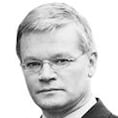Tuesday evening was the awards dinner for The Irish Times Innovation Awards. As chair of the judging panel, and having been involved for several years, I was invited to give some thoughts on the importance of innovation to our economy.
"Then, I said, let us begin and create in idea a State; but the true creator is necessity, who is the mother of invention." So wrote Plato in Book II of his dialogue The Republic. A state is founded on an idea. But the idea is a response to necessity. Need, difficulty and challenge drive inventiveness and ingenuity.
Eight years ago, our country was struggling in a vicious recession. Coincidentally, 2010 was also the first year of The Irish Times Innovation Awards. Uncertain times and economic challenges frequently stimulate novel approaches to solving problems. New opportunities can arise as established and incumbent companies stumble. As any professional investor knows, volatility can drive opportunity.
Today, one of the most serious threats to our continued national wellbeing is Brexit. Simon Carswell thoughtfully documented the dangers to our economy when he wrote last Saturday in this newspaper of his recent experiences riding with a trucker, on a six-country two-day delivery from a depot in Mulhuddart to Weisbaden, with a consignment of high-value pharmaceuticals.
Some 150,000 heavy vehicles, carrying three million tonnes annually, travel between the continent and Ireland by passing across the United Kingdom. The longer, direct sea routes from Ireland to the continent are currently more expensive, and have far less capacity than the UK ferry services – and drivers would still have long hours on continental roads to reach the Benelux countries and Germany.
A report this summer asserted we were the second-worst in the EU in tackling our national climate change commitments
Another of the most serious threats to our continued national prosperity is climate change. The Government recently announced that increased carbon taxes are on the way from next year, on a trajectory to 2030 to tightly reign-in our national carbon emissions. A report this summer asserted we were the second-worst in the EU (behind Poland) in tackling our national climate change commitments, and face an imminent €500 million annual non-compliance penalty.
Transportation emissions
Today, 95 per cent of the world’s transportation emissions come from carbon-based fuels, and yet we continue to lug freight around the world by marine, aviation and ground transports. Our supply chains are globally networked. including much of the food that appears on our supermarket shelves, and much of the Irish food that appears on supermarket shelves internationally. Brexit threatens our freight and supply chains. Climate change adds to the challenges.
Our national prosperity depends on public engagement with the electoral process
Yet a further serious threat to the continued wellbeing of Ireland is the rise of the politics of the separatist state, not only in the UK with Brexit but in the United States, and in some EU member states. Retrenchment from international neighbours, bilateral rather than community trade arrangements, and closed frontiers to labour and talent, all seem to me to be delusional ideas on which to strengthen a state.
Plato observed that the price a population paid for indifference to public affairs was consequently to be ruled by disastrous leadership. Our national prosperity depends on public engagement with the electoral process. Our economic growth in turn depends on how competently our chosen elected leaders manage our national interests with other governments.
Global freight hub
Weisbaden is just a couple of hundred kilometres to the south of Duisberg. Duisberg, on the Rhine, is now the world's largest inland port. It has also rapidly become a global freight hub. Some 30 freight trains a week arrive in Duisberg from various locations in China. It takes just 12 days to carry freight from eastern China (for example Shanghai) to Duisberg, instead of 45 days by ship. Six of those days are taken for the major part of the journey, to reach Belarus. A further six days are taken for the relatively short hop from Belarus to Germany, given the inertia caused by multiple national rail unions across Europe. Clearly, the 12-day transit time may well reduce in the future.
The "Belt and Road" strategy undertaken by President Xi Jinping to re-establish a modern Silk Road is already transformational to transit countries such as Kazakhstan and Belarus. It also is radically reorienting the economy of the European continent towards China.
Hard Brexit
Some in the UK apparently believe Germany and other continental member states of the EU may have much to lose in the export of their products should there be a hard Brexit. However, simultaneously much more significant opportunities have been concurrently opening up to the East.
Brexit, climate change, the efficiency and practicality of international freight transport, and changing international trading norms and tariff structures all point to a volatile business environment. They also point to the attraction of international services over physical product.
As Plato observed, every state is founded on an cherished idea, a founding belief, a creed of shared values. Nevertheless, the true ability to sustain and grow a state is the intelligence to respond to changing necessities, to evolving circumstances and to a changed international perspective. Necessity nurtures successful innovation, and our national capacity to continuously innovate in volatile circumstances may well determine the future of our own State.













